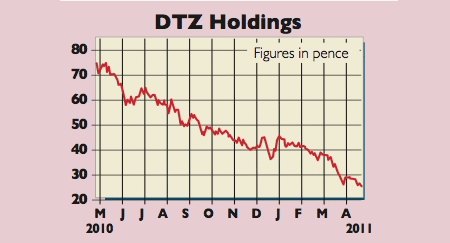
Don’t hold your breath, but we may be reaching a tipping point for the beleaguered commercial property market. Since 2008 the biggest obstacle has been narrowing the price gap between sellers’ unrealistic expectations and the vulture-like activities of prospective buyers.
But this inertia appears to be melting. Last week Ireland’s National Asset Management Agency (NAMA) – the ‘bad bank’ set up to take responsibility for the country’s toxic loan portfolio – said it would aggressively step up property sales. Likewise, Royal Bank of Scotland is preparing to offload vast tracts of its real estate assets in Germany, Britain and America. Better still, it appears there could soon be a deluge of commercial property transactions in Europe, as existing mortgages fail to be refinanced by more belligerent lenders. True, this supply glut could whack prices again. Yet it could also do wonders for DTZ, the global real estate agent, as it helps more banks wind-down their building exposure.
Admittedly, this process may take a while to get underway. However, over the next two years I expect it to begin in earnest as the EU’s bank stress tests and sovereign austerity measures take effect, forcing finance houses finally to bring out their dead.
Up until this point DTZ’s core business will probably remain in the doldrums, especially as it is currently being affected by a shrinking UK public sector. Elsewhere, its Chinese unit is also decelerating, due to Beijing’s curbs on property speculation.
DTZ Holdings (LSE: DTZ)
Nonetheless, this shouldn’t cause too much angst, since the firm is now in very good shape cost-wise to weather any near-term storms. This was reflected at the update in March. DTZ commented that “trading continues broadly in line with expectations for the full year to 30 April 2011”, although “we remain cautious”.
With regard to the numbers, the City is forecasting 2011 sales and pre-tax losses of £349m and £3m respectively. By 2013 I would expect the company to be operating at full-tilt again, delivering corresponding revenues and operating profits of £450m and £25m.
On this basis, I would value the group on a ten-times operating profits multiple, which, adjusting for the £80m of net debt and discounting back at 12%, delivers an intrinsic value of around 44p a share.
So what hitches should you look out for? On the downside, transactional volumes could stay weaker for longer than expected. And foreign-exchange fluctuations and debt levels will also need to be watched.
Recommendation: Speculative BUY at 26p (market cap £70m)